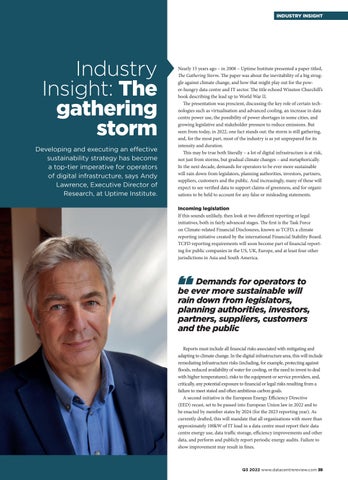INDUSTRY INSIGHT
Industry Insight: The gathering storm Developing and executing an effective sustainability strategy has become a top-tier imperative for operators of digital infrastructure, says Andy Lawrence, Executive Director of Research, at Uptime Institute.
Nearly 15 years ago – in 2008 – Uptime Institute presented a paper titled, The Gathering Storm. The paper was about the inevitability of a big struggle against climate change, and how that might play out for the power-hungry data centre and IT sector. The title echoed Winston Churchill’s book describing the lead up to World War II. The presentation was prescient, discussing the key role of certain technologies such as virtualisation and advanced cooling, an increase in data centre power use, the possibility of power shortages in some cities, and growing legislative and stakeholder pressure to reduce emissions. But seen from today, in 2022, one fact stands out: the storm is still gathering, and, for the most part, most of the industry is as yet unprepared for its intensity and duration. This may be true both literally – a lot of digital infrastructure is at risk, not just from storms, but gradual climate changes – and metaphorically. In the next decade, demands for operators to be ever more sustainable will rain down from legislators, planning authorities, investors, partners, suppliers, customers and the public. And increasingly, many of these will expect to see verified data to support claims of greenness, and for organisations to be held to account for any false or misleading statements. Incoming legislation If this sounds unlikely, then look at two different reporting or legal initiatives, both in fairly advanced stages. The first is the Task Force on Climate-related Financial Disclosures, known as TCFD, a climate reporting initiative created by the international Financial Stability Board. TCFD reporting requirements will soon become part of financial reporting for public companies in the US, UK, Europe, and at least four other jurisdictions in Asia and South America.
Demands for operators to be ever more sustainable will rain down from legislators, planning authorities, investors, partners, suppliers, customers and the public Reports must include all financial risks associated with mitigating and adapting to climate change. In the digital infrastructure area, this will include remediating infrastructure risks (including, for example, protecting against floods, reduced availability of water for cooling, or the need to invest to deal with higher temperatures), risks to the equipment or service providers, and, critically, any potential exposure to financial or legal risks resulting from a failure to meet stated and often ambitious carbon goals. A second initiative is the European Energy Efficiency Directive (EED) recast, set to be passed into European Union law in 2022 and to be enacted by member states by 2024 (for the 2023 reporting year). As currently drafted, this will mandate that all organisations with more than approximately 100kW of IT load in a data centre must report their data centre energy use, data traffic storage, efficiency improvements and other data, and perform and publicly report periodic energy audits. Failure to show improvement may result in fines.
Q3 2022 www.datacentrereview.com 39








